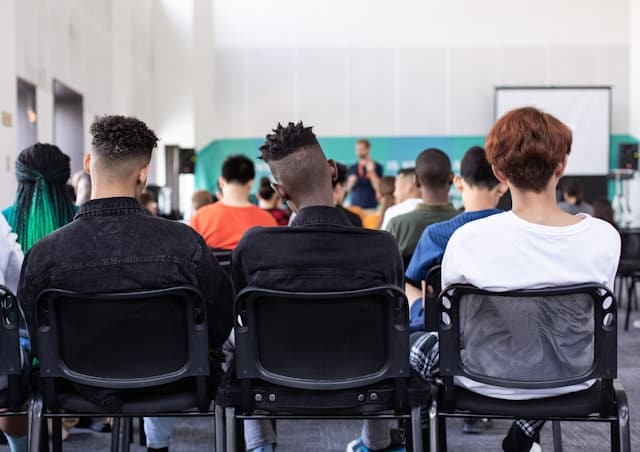Gaining admission into any of the universities in Nigeria is a dream come true for every student. For someone like me, it took me sitting for the JAMB exam five (5) times to achieve this goal.
Most importantly, you have succeeded in getting into a tertiary institution, whether a federal, state, or private university. I want to say a big congratulations to you.
Regarding academics and campus lifestyle, the university system differs from what you have experienced in secondary school. Feeling lost or overwhelmed during your first few weeks or months in school away from your loving family and friends is normal.
Many newly admitted students end up making costly mistakes in their first year that they regret throughout their stay at the university.
In this post, I will walk you through essential tips and things you must know as a fresher in a university in Nigeria. Let me know in the comments if you have any questions.
Table of contents
Advice for Nigerian University Freshers
- Get Hostel Accommodation
- Complete Your First Year Clearance
- Attend Orientation Ceremonies
- Attend All Your Lectures
- Study Ahead Using the Course Outline
- Get Past Questions and Relevant Textbooks
- Create or Join a Study Group
- Attend Evening Reading Class
- Manage Your Finance Properly
1. Get Hostel Accommodation

Hostel accommodation is the first thing you need to get sorted out as a first-year student at the university. Getting good grades is impossible if you don’t have a place to stay to enable you to attend lectures.
Booking hostel accommodation is stressful in public institutions like federal and state universities. These schools usually use a first come basis in giving out these hostel spaces; that is, priority is given to those who apply early enough for them.
Ensure you make all payments and make necessary inquiries from senior students in your school on how best to book a hostel space. In some schools, a particular time and date is fixed for the opening of the hostel portal.
Those wanting to stay off-campus also need to ensure they rent the hostel on time before it becomes scarce and expensive.
Also, ensure the environment you would be staying in is safe, has a constant electricity supply, and is close to your school campus.
You will wonder if you should stay off-campus or at the school hostel. You must have heard that those in the school hostel achieve better academic success than those outside. That is not true; it depends on what you want, and you can achieve good grades in any environment.
2. Complete Your First Year Clearance

As a newly admitted student at the university, you would be made to do a lot of registration at the admission office, your faculty, and your department.
It is a stressful process that can take weeks, and students who start late have to combine attending lectures with this process, which is usually stressful and affects their academics.
Ensure you resume early and make all necessary school payments to complete your first-year clearance to focus on lectures.
Some of the documents you would need are;
- O’level Result (WAEC, NECO or NABTEB)
- JAMB Admission Letter
- Birth Certificate
- Original JAMB Result
- Local Government of Origin
- Tuition Fees Payment Receipt
- Letter of Undertaking
- Post UTME Result Slip, etc.
3. Attend Orientation Ceremonies

Your school, faculty, department, fellowship, and ethnic groups organize orientation ceremonies. It may feel like many events, but I want to let you know it is necessary to attend them.
Orientation ceremonies give you the information you need about the school and the course you are studying.
During the orientation, you would be taught things like;
- The school rules and regulations
- School anthem
- How to calculate CGPA
- Tips to graduate with good grades
- Information about the school health facility
- Sport facilities
- Security, etc
All of this information may seem basic, but I want to assure you that as a first-year student, you would find all of this information helpful.
My advice to you is to ensure you attend all of these orientation events as much as possible. They would shape your mindset to achieve academic success in the long run.
4. Attend All Your Lectures

Attending all your lectures is necessary to get good grades as a first-year student. It may seem as if these classes are tedious and stressful, but they are your key to achieving academic success.
I attended a Federal university and believe going for classes was a challenging experience. The lecture halls were small for our large populations. But, in all, I can say that it was worth it.
During classes, lectures usually give hints on areas where questions would be asked in the exam. Only students who go to class would benefit.
Also, it would be easier to know the part of the course materials you want to focus on rather than reading unnecessary materials.
Another reason why you should attend lectures is attendance. Some course lectures give free marks to students who come for their classes as part of their continuous assessment.
5. Study Ahead Using the Course Outline

Studying ahead of your lectures using the course outline is an open secret to getting a first-class CGPA in your first year.
Many students make the mistake of waiting till a week for their examination before they begin studying. It is wrong to use this approach because you would not be able to understand your course material due to the last-minute study approach.
Many of my university coursemates who tried this approach ended up falling sick or experiencing one problem or the other during their examinations.
Every course you take at the university has an outline containing the topics you must cover for your examination. You can use it to your advantage by studying what you learn daily.
It would enable you to be ahead of your colleagues, and you’d be able to follow the lecture and ask necessary questions.
6. Get Past Questions and Relevant Textbooks

Studying using past questions is a good strategy to pass your exams excellently. The past questions serve two purposes;
- Evaluate your level of preparation.
- Guide you on the format of questions you will face in your exams
As you must have heard, many professors don’t have the time to set new questions as they have been teaching the same material for over ten (10) years.
Ensure you get these questions and possibly textbooks from your senior colleagues for your study regime.
7. Create or Join a Study Group

A study group is the coming together of two (2) to four (4) persons to teach themselves by sharing topics and answering past questions.
In my first year at the university, I created a study group where I discussed with about four (4) persons why we need to tackle our academic work together. I can say that this decision helped me to get good grades.
Concerning group study, you must ensure you are not more than three (3) persons for a beneficial study discussion. Also, it would be best if you enforced the following guidelines;
- No late coming
- There will be no gossiping or irrelevant discussions
- Participants must study before the group meeting
- Group study should be done at a fixed time and specific location
- No new entry of members
- No eating or sleeping during the discussion, etc.
8. Attend Evening Reading Class

Evening is one of the best times to read at the university because lecture theatres or libraries are usually less populated.
By evening class, I mean between 5 pm to 10 pm. From 9 pm, classes become rowdy because of those who come for night classes, which is usually like a get-together party with noise.
Another best time to read is between 4 am and 7 am. At this time, students would leave classes at their hostel, which becomes conducive to reading.
Note that this schedule does not apply to those who prefer to study in their hostel rooms.
9. Manage Your Finance Properly

Managing your finances properly is necessary because you cannot study effectively on an empty stomach.
As a newly admitted student, you would receive a lot of money from your parents, and there is this compulsion to overspend on campus on food and clothing.
Practice financial management through budgeting and cutting down expenses when necessary.
The major culprit that makes students spend money is eating at restaurants. If possible, cook your food to save money.
Conclusion
Starting university is an exciting and transformative chapter in your life. As a Nigerian fresher, you’re stepping into a world of independence, challenges, and opportunities.
Remember to embrace this journey with an open mind, prioritize academics, build meaningful connections, and make time for personal growth.
Stay true to yourself, ask for help when needed, and always keep your long-term goals in sight.
Let me know if you have any questions or have further questions. I would love to hear from you.
